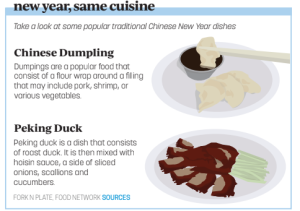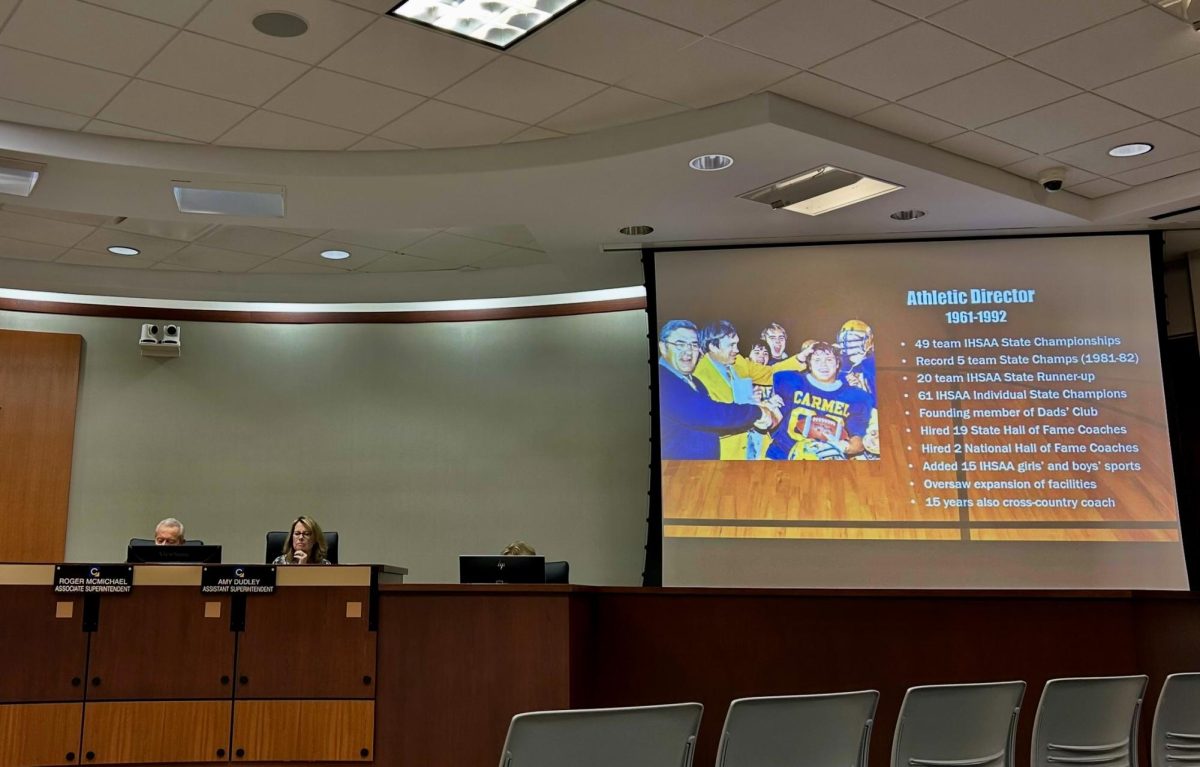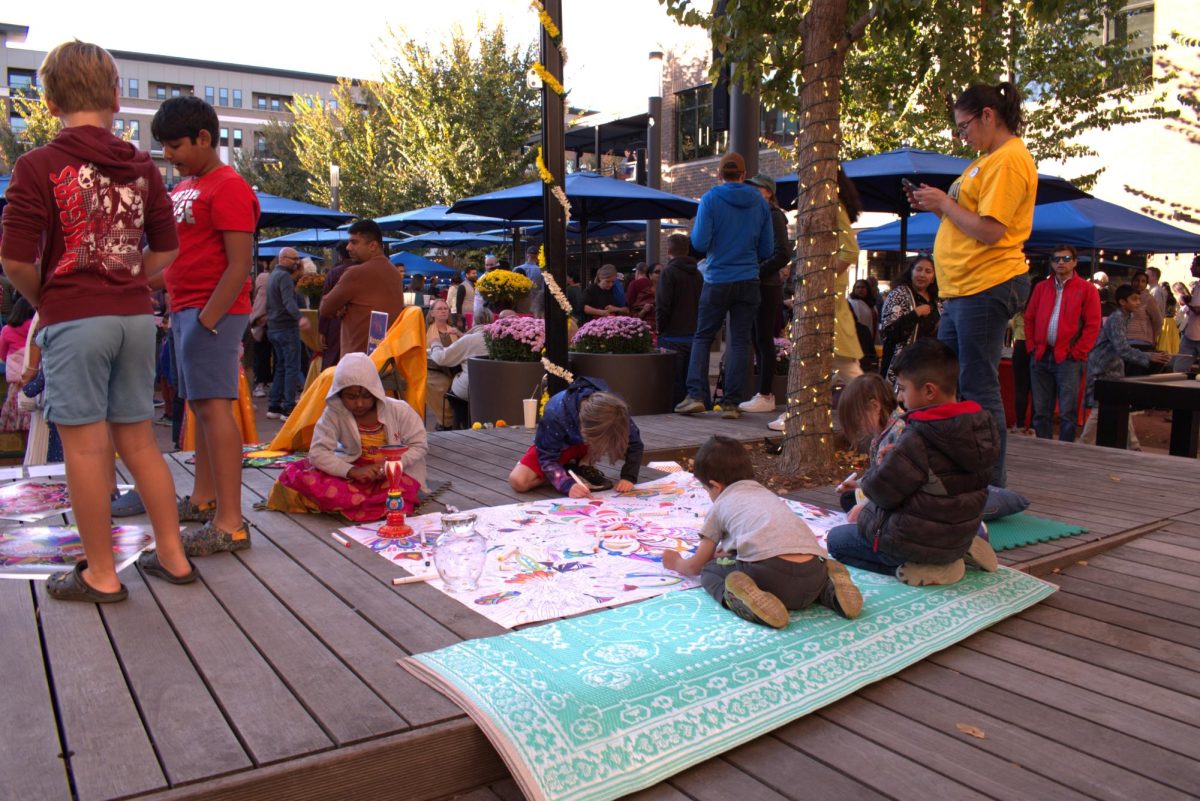The National Chinese Honor Society (NCHS) will host a celebration event for Chinese New Year. This cultural holiday will happen on Feb. 1 and also marks the beginning of the Lunar New Year.
This event will provide traditional Chinese foods often eaten in the new year, such as jiaozi (dumplings) and baozi (steamed buns). These foods are steamed and both contain a variety of vegetables and meats filled inside of them. Alongside this, traditional Chinese music will play at the event.
Tungfen Lee, NCHS sponsor and Chinese teacher, said in previous years, NCHS celebrated Chinese New Year differently.
“We used to host Chinese New Year events at the Carmel Clay Public Library and invited people in the community to celebrate. All students and family (everyone in the community)are welcomed and encouraged to participate in the cultural events sponsored by NCHS,” she said via email.
Junior Alleson Gao said she has been celebrating Chinese New Year for most of her life.
“Chinese New Year is a day that brings the family together- for my family we always make dumplings together and eat them for dinner,” she said.
She said a memorable moment when celebrating Chinese New Year was when she would go to church.
“At church we would dress up wearing a traditional Chinese dress and sing songs and also eat food. We would also receive red envelopes and they would place a $2 bill inside.” Gao said.
Lee said this is an extremely memorable holiday.
She said, “When I was in Taiwan, I enjoyed celebrating Chinese New Year with my immediate and extended families-we have more than thirty people altogether.”
Alongside these familial celebrations, people observe some superstitions or taboos with the tradition.
Teresa Yu, member of NCHS and junior said, taking medicine, sweeping the floor, washing clothes and cutting hair are all cultural taboos that are usually followed during Chinese New Year.
She said, “I would say that some people might not understand and find the superstitions of Chinese New Year to be odd. This can cause some stereotypes that Chinese New Year seems very superstitious when, in reality, it’s just like how all cultures have their own beliefs.”
Yu also said many times when a family moves to the United States after living in China, they will stop celebrating certain traditions to assimilate. This, she said leads to an overall underrepresentation of what Chinese New Year is.
But Gao said Chinese New Year presents an opportunity for others to learn about Chinese culture.
“By learning about Asian American culture and Asian American History, we also are learning about American history and the Asian American community,” she said.






























![Keep the New Gloves: Fighter Safety Is Non-Negotiable [opinion]](https://hilite.org/wp-content/uploads/2024/12/ufcglovescolumncover-1200x471.png)






!["Wicked" poster controversy sparks a debate about the importance of accuracy versus artistic freedom [opinion]](https://hilite.org/wp-content/uploads/2024/11/riva-perspective-cover-1200x471.jpg)









































![Review: “We Live in Time” leaves you wanting more [MUSE]](https://hilite.org/wp-content/uploads/2024/12/IMG_6358.jpg)
![Review: The premise of "Culinary Class Wars" is refreshingly unique and deserving of more attention [MUSE]](https://hilite.org/wp-content/uploads/2024/12/MUSE-class-wars-cover-2.png)
![Introducing: "The Muses Who Stole Christmas," a collection of reviews for you to follow through winter [MUSE]](https://hilite.org/wp-content/uploads/2024/12/winter-muse-4.gif)
![Review: "Meet Me Next Christmas" is a cheesy and predictable watch, but it was worth every minute [MUSE]](https://hilite.org/wp-content/uploads/2024/11/AAAAQVfRG2gwEuLhXTGm3856HuX2MTNs31Ok7fGgIVCoZbyeugVs1F4DZs-DgP0XadTDrnXHlbQo4DerjRXand9H1JKPM06cENmLl2RsINud2DMqIHzpXFS2n4zOkL3dr5m5i0nIVb3Cu3ataT_W2zGeDAJNd_E-1200x884.jpg)
![Review: "Gilmore Girls", the perfect fall show [MUSE]](https://hilite.org/wp-content/uploads/2024/11/gilmore-girls.png)
![Review in Print: Maripaz Villar brings a delightfully unique style to the world of WEBTOON [MUSE]](https://hilite.org/wp-content/uploads/2023/12/maripazcover-1200x960.jpg)
![Review: “The Sword of Kaigen” is a masterpiece [MUSE]](https://hilite.org/wp-content/uploads/2023/11/Screenshot-2023-11-26-201051.png)
![Review: Gateron Oil Kings, great linear switches, okay price [MUSE]](https://hilite.org/wp-content/uploads/2023/11/Screenshot-2023-11-26-200553.png)
![Review: “A Haunting in Venice” is a significant improvement from other Agatha Christie adaptations [MUSE]](https://hilite.org/wp-content/uploads/2023/11/e7ee2938a6d422669771bce6d8088521.jpg)
![Review: A Thanksgiving story from elementary school, still just as interesting [MUSE]](https://hilite.org/wp-content/uploads/2023/11/Screenshot-2023-11-26-195514-987x1200.png)
![Review: "When I Fly Towards You", cute, uplifting youth drama [MUSE]](https://hilite.org/wp-content/uploads/2023/09/When-I-Fly-Towards-You-Chinese-drama.png)
![Postcards from Muse: Hawaii Travel Diary [MUSE]](https://hilite.org/wp-content/uploads/2023/09/My-project-1-1200x1200.jpg)
![Review: "Ladybug & Cat Noir: The Movie," departure from original show [MUSE]](https://hilite.org/wp-content/uploads/2023/09/Ladybug__Cat_Noir_-_The_Movie_poster.jpg)
![Review in Print: "Hidden Love" is the cute, uplifting drama everyone needs [MUSE]](https://hilite.org/wp-content/uploads/2023/09/hiddenlovecover-e1693597208225-1030x1200.png)
![Review in Print: "Heartstopper" is the heartwarming queer romance we all need [MUSE]](https://hilite.org/wp-content/uploads/2023/08/museheartstoppercover-1200x654.png)



